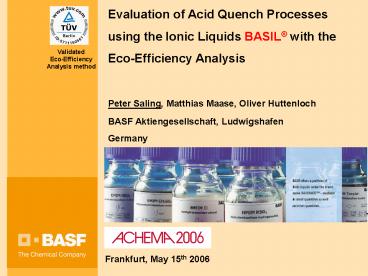Ecoefficiency analysis PowerPoint PPT Presentation
1 / 29
Title: Ecoefficiency analysis
1
Evaluation of Acid Quench Processes using the
Ionic Liquids BASIL with the Eco-Efficiency
Analysis Peter Saling, Matthias Maase, Oliver
Huttenloch BASF Aktiengesellschaft,
Ludwigshafen Germany
Frankfurt, May 15th 2006
2
Chemistry has an important role to play in
achieving a sustainable civilization on
earth. Dr. Terry Collins, Professor of
ChemistryCarnegie Mellon University
3
The Eco-Efficiency Analysis leads us to a more
sustainable future
4
Sustainable Development is based onthree Pillars
Sustainable Development
Ecology
Society
Economy
5
BASF competences
- The BASF has an leading expertise in the world
because - BASF is a company with a high level of competence
in sustainability matters and professes itself to
sustainable management - BASF runs four competence centers of
Eco-Efficiency Analysis and finalized up to now
more than 250 studies - the BASF-method has been validated by the TÜV in
the year 2002 - BASF cooperates trustfully with
governmentaldepartments, NGOs, the UN, the GTZ
etc.
6
TopicOutstanding Advantages of Ionic Liquids
- Ionic Liquids have to offer
- liquid at lt100C
- broad liquid range
- virtually no vapour pressure
- high polarity
- high dissolving power for organic as well as
inorganic materials - excellent thermal, mechanical and electrochemical
stability - high heat capacity
- non flammable
- electrical conductivity
7
Use of Ionic Liquids
- Ionic Liquids are useful for
- as process chemicals for separation processes,
acid quench - as reaction media in chemical processes
- such as extraction or distillation
- as auxiliaries in varnish, paint systems or
- cleaning agents
- But Are Ionic Liquids sustainable materials? Is
the use of Ionic Liquids in an acid quench
process step sustainable? How to improve the
process and the materials?
8
What is the Eco-efficiency Analysis?
- A strategic tool developed by BASF to quantify
Eco-efficiency
- Provides a quantitative measure of the economic
and ecological benefits of a product or process
as compared to other products or processes - Identification of the most sustainable BASF
alternative for a defined customer benefit
9
Definition of Alternatives
10
Chemical process of EDPP with MIA
11
System Boundaries Ethoxydiphenylphosphine
(EDPP) and BASIL
12
System Boundaries Ethoxydiphenylphosphine
(EDPP) and Amine
13
Chemical process of DEPP with MIA
14
System Boundaries Diethoxyphenylphosphine
(DEPP) and Amine
15
Life-Cycle Costs
16
Energy Consumption of the Alternatives
17
Air Emissions Summersmog (POCP)
18
Comparison of Water Emissions
19
Ecology Fingerprint of BASF - EDPP
20
Base Case Portfolio of EDPP-Alternatives for
Acid Quench
21
Base Case Portfolio of DEPP-Alternatives for
Acid Quench
22
Improvement of processes by using the
Eco-Efficiency Internet Manager First
application in a joint project with UNIDO, UNEP
and BASF for the textiles industry in Africa
This Public Private Partnership Project of BASF
is nominated to the European Business Arward for
the environment 2006.
23
Summary
- Due to the environment the BASIL processes are
much greener and much more sustainable than the
Amine-processes. - The quench-step and the recycling step have
important impacts on the overall results. - The results are robust, differences in input data
in certain ranges have no major influence to the
overall result. A variation of the societal
weighting factors have low impact to the result.
24
The Eco-Efficiency Label
- Requirements
- Accomplished Eco-Efficiency Analysis according to
the methodology certified by TÜV Rhineland/
Berlin-Brandenburg, Germany. - Verification of the investigated product to be
more eco-efficient for the defined customer
benefit than other alternatives as result of the
analysis. - Presentation of a third party evaluation
(so-called Critical Review according ISO 14040
ff.). - Publication of the results via internet on
website www.oeea.de, which is referred to on the
label. - Payment of the license fee for the duration of
three years (s. price list).
25
Use of the Eco-efficiency Analysis tool
26
Global 100 of the most sustainable companies in
2006
For BASF, the Innovest Association admires the
environmentally friendly strategy of the company,
the development of sustainable products and the
use of the in-house developed Eco-Efficiency
Analysis for comparison and optimization of
advantages for the Environment and costs for
different products.
27
Consequences of Eco-Efficiency Analyses
Environmental Impact (normalized)
low
Bring to market!
Depending on the position of the analysed
product, different strategical recommen- dations
are given.
1,0
high
high
low
1,0
costs (normalized)
28
BASF offers unique services around assessing
sustainability
ExpertServicesSustainability BASF
- Sustainability and SD-Center
- Eco-Efficiency Analyis
- LCA, LCI, LCC
- Evaluation of sustainability
- Eco-Efficiency AnalysisManager Online
- Eco-Efficiency -Label
- SEEbalance, CSR
- Reporting, conferences
- REACH- Consulting
- Energy consulting
- Waste management
- Medical Services
- Regulation
29
Contact
Thank you for your kind attention! For more
information about BASIL please contact Dr.
Mathias Maase BASF Aktiengesellschaft CZ/BC 49
621 60-48788 mathias.maase_at_basf.com For more
information about the Eco-Efficiency Analysis
please contact Dr. Peter Saling BASF
Aktiengesellschaft GUP/CE 49 621
60-58146 peter.saling_at_basf.com www.oekoeffizienzan
alyse.de

